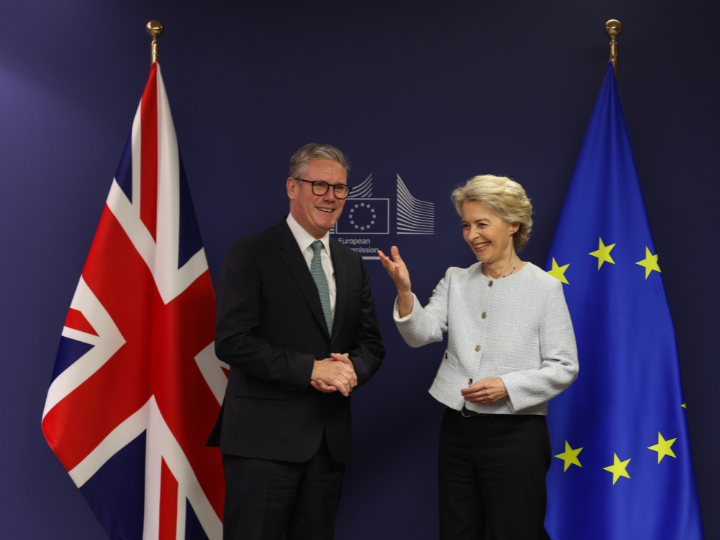by Rajnish Singh
On Wednesday, 2 April, US President Donald Trump announced his reciprocal ‘Liberation Day’ tariff plan to the world press. He unveiled a list of countries and the varying tariff levels he intended to impose on their exports. The following day, financial markets around the world crashed in response.
Trump’s announcement sent shock waves through global markets, sparking fears of a worldwide recession due to potential trade wars between the affected countries and the US. The concern reached such a level that even children’s news programmes in the UK covered the story, using the popular Lego brand to illustrate how tariffs could impact the price of toys.
Such a seismic event in the global economy prompted various responses from world leaders. Within Europe, differences quickly emerged between UK Prime Minister Keir Starmer and European Commission President Ursula von der Leyen regarding how to respond to Trump’s announcement.
Though the UK faced a 10% tariff, less than half of the 25% imposed on the EU, Starmer and his team felt compelled to act swiftly, drafting an official response within an hour of Trump’s announcement. Their statement was ready in time for the national TV news and was published in newspapers and online. In contrast, von der Leyen took a more measured approach, issuing only a brief statement several hours later.
On Saturday, 5 April, Starmer published a full editorial in the right-wing Daily Telegraph — a newspaper known to be his harshest critic. In it, he explained how he planned to handle Trump’s tariffs and reassure both the UK and financial markets. Meanwhile, von der Leyen remained silent.
In his article, he stated that his priority was to keep calm and fight for the best deal. In contrast, the Commission President took a more aggressive stance in her initial statement, saying she was already working on countermeasures. This further fuelled fears of a trade war between the two blocs and, of course, scared the markets even more.
Starmer stressed his belief in free markets, particularly trade agreements, but also, just as importantly, in improving domestic competitiveness. This included working on an industrial policy to help shield British companies from trade wars. Already, there is talk of renationalising British Steel. He also rightly pointed out that working people would be hit hardest in any fallout and stressed that he would take measures to protect them.
Meanwhile, in contrast to Starmer’s proactive approach, von der Leyen remained largely silent after her initial statement on Thursday, 3 April, in which she threatened countermeasures. She did not speak again until Monday, 7 April, during a visit to Norway, by which time markets had plunged even further. There, she announced that the EU would offer the US a “zero-on-zero” trade tariff deal.
Even as the European trade bloc faced its biggest existential threat, the Commission President prioritised her official visits. Even her press team admitted, “We’re in a sticky situation here.”
While von der Leyen was in Norway, EU trade ministers gathered in Luxembourg for Monday’s first round of meetings. Apart from the zero-on-zero offer, little of substance emerged.
Washington has scheduled 17 April for a meeting with the EU to discuss trade. However, instead of von der Leyen, Italian Prime Minister Giorgia Meloni will represent the EU—reflecting the deep lack of confidence European leaders have in the Commission President’s ability to negotiate with Trump.
Financial markets are in a tailspin, and businesses across Europe brace for impact. The contrast between Starmer’s pragmatism and reassurance and von der Leyen’s more aggressive, delayed response highlights a deeper divide in leadership styles. While the UK moves swiftly to ensure stability and economic resilience, the EU risks becoming trapped in a cycle of hesitation and reactionary measures.
Tensions are rising, and fears of a trade war are mounting—not just among economists and business leaders but also among ordinary people bracing for a recession. The key question now is: Will diplomacy prevail, or are we witnessing the opening shots of a new economic conflict? And crucially, is von der Leyen the right leader to steer the EU through this crisis and new world order?




 By: N. Peter Kramer
By: N. Peter Kramer

